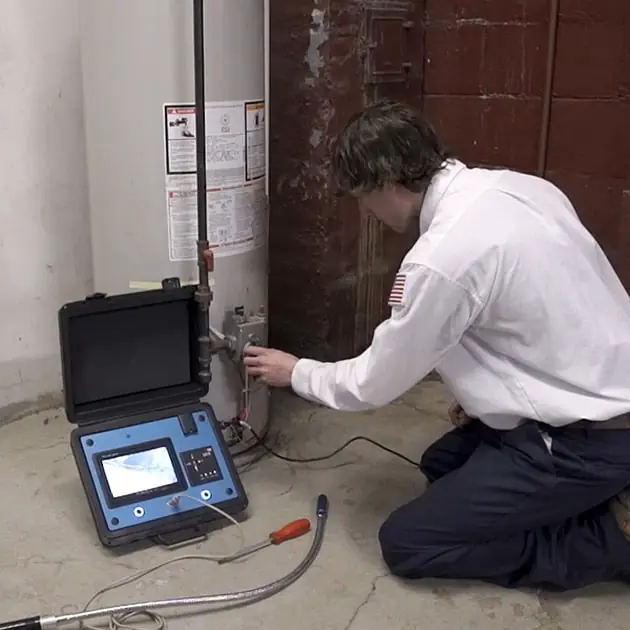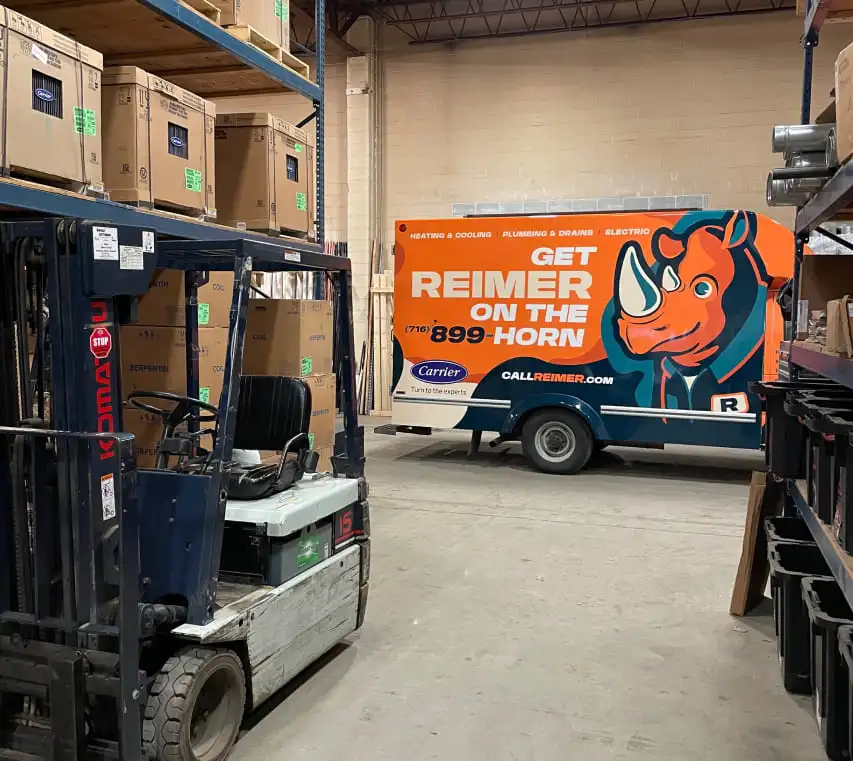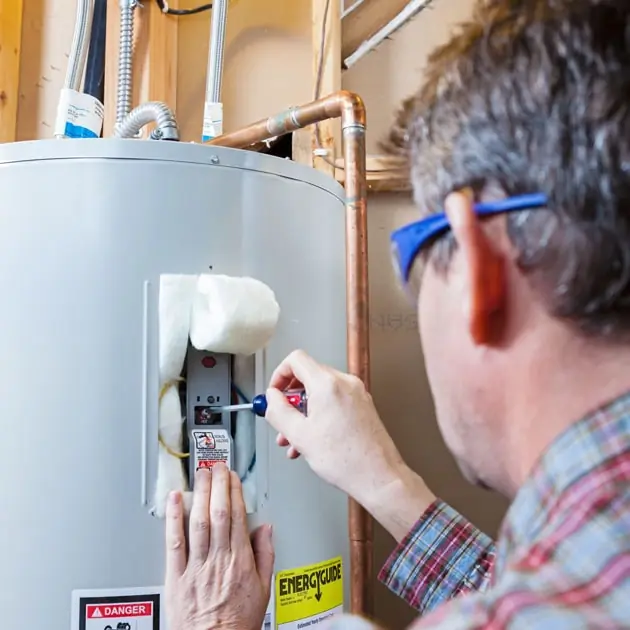Keeping your water heater in good shape is important. At Reimer, we provide water heater maintenance services across Upstate New York. Regular maintenance can help your water heater last longer, run more efficiently, and prevent unexpected issues.
Our technicians will inspect, clean, and tune up your water heater to make sure it’s working properly. We know the common problems in Upstate New York, like hard water and temperature changes, and we’re ready to handle them.

Want to keep your water heater running smoothly? Call Reimer at (716) 272-2371 to schedule your maintenance. We’re here to help.
Book an Appointment
ANY PLUMBING REPAIR
Our Water Heater Maintenance Process in Upstate New York
Keeping your water heater in top shape is easier than you think. Here’s how we do it at Reimer.
Thorough Inspection
We start with a detailed check-up. Think of it like a doctor’s visit for your water heater. We look at key parts like the thermostat, heating elements, and anode rod to make sure everything’s in working order. Spotting small issues early can prevent bigger problems later.
Flushing the Tank
Hard water leads to sediment buildup, which affects efficiency. We flush the tank to clear out the sediment. This simple step helps your heater work better and last longer.
Safety First
We test the pressure relief valve and other safety features to make sure everything’s functioning properly. This step helps prevent potential hazards and keeps your system safe.
Routine Tune-Up
Finally, we tune up your water heater. This includes adjusting the thermostat, checking all connections, and ensuring there are no leaks. A well-maintained water heater runs more efficiently and saves you money on energy bills.
Regular maintenance is like a health check for your water heater. It keeps everything running smoothly and helps avoid unexpected breakdowns. It’s a small effort with big benefits.
Need to schedule your water heater maintenance? Call Reimer at (716) 272-2371. We’re here to help with all your water heater needs.
Water Heater Maintenance FAQ
Benefits of Professional Water Heater Maintenance and Tune-Up Services
Taking care of your water heater is more than just ticking a box on your home maintenance checklist. Here’s why regular maintenance is a game-changer:
Better Efficiency
Regular tune-ups help your water heater run smoothly, using less energy to heat the same amount of water. This means lower utility bills each month. Imagine it’s like keeping your vintage synthesizer in perfect tune—everything just works better and sounds sweeter. When the parts are clean and well-adjusted, they perform at their best, ensuring you get the most out of every drop of hot water.
Longer Lifespan
Routine maintenance helps catch small issues before they turn into big, costly problems. By addressing wear and tear early, you can extend the life of your water heater significantly. Think of it as ensuring your heater remains a long-term, reliable part of your home, avoiding premature replacements.
Consistent Hot Water
No one likes the shock of a cold shower. Regular maintenance ensures your water heater delivers consistent hot water when you need it. Flushing out sediment and checking heating elements means you can count on your heater to perform. When everything is in order, your water temperature stays steady, making daily routines smoother and more pleasant.
Improved Safety
Safety checks are a crucial part of maintenance. Technicians will look at the pressure relief valve, inspect for gas leaks, and ensure the unit is operating safely. Prevention is always better than dealing with an emergency. Regular inspections mean you can trust that your heater is not only working but doing so safely.
Saving Money
Preventing major repairs through regular maintenance saves you money in the long run. Plus, a well-maintained heater is more efficient, cutting down your energy costs. It’s like finding a bargain that saves you cash in the long run. Addressing minor issues early means avoiding the hefty costs of major breakdowns or emergency services.
Better Performance
A maintained water heater heats water faster and keeps the temperature steady. Daily chores become easier, whether it’s washing dishes, doing laundry, or taking a shower. Consistent performance means fewer interruptions and a smoother household operation.
Peace of Mind
Knowing your water heater is in top shape gives you one less thing to worry about. With regular check-ups, you can relax, confident that your heater won’t let you down when you need it most. This peace of mind is invaluable, reducing stress and providing assurance that your home’s hot water needs are reliably met.
Environmentally Friendly
An efficient water heater uses less energy, which is better for the environment. Maintenance helps you reduce your carbon footprint. By keeping your heater in peak condition, you’re not only saving on bills but also contributing to a greener planet. Efficient energy use means less waste and a more sustainable household.
Warranty Protection
Many warranties require regular maintenance. Keeping up with tune-ups ensures you’re covered if something goes wrong. If your water heater develops a fault, having a maintenance record means you can get repairs or replacements covered under warranty, saving you unexpected expenses.
Expert Tips
During a maintenance visit, technicians can answer your questions and give you tips on how to keep your water heater running well. Think of it as friendly advice from fellow synth enthusiasts. These experts can provide valuable insights on best practices, energy-saving tips, and how to troubleshoot minor issues, empowering you to take better care of your water heater between professional visits.
Regular maintenance is not just about avoiding problems—it’s about keeping your water heater efficient, reliable, and safe. With professional tune-ups, you’re investing in the longevity and performance of a crucial home appliance, making your life easier and more comfortable.
Types of Water Heaters We Service
At Reimer, we take care of different types of water heaters to keep your home comfortable, whether you’ve got a gas water heater or a tankless one.
Gas Water Heaters
Gas water heaters are solid and reliable. They heat water quickly, which is great for big families or if you use a lot of hot water. While installing one might cost a bit more upfront, they’re cheaper to run in the long haul.
With regular check-ups, gas water heaters can last many years. They come in various sizes, so there’s one that will fit your home perfectly.
Tankless Water Heaters
Tankless water heaters are popular because they’re efficient and don’t take up much space. They only heat water when you need it, which saves you money on energy bills.
These units are perfect for smaller homes since they’re compact. Plus, you’ll never run out of hot water. With good maintenance, tankless water heaters can last even longer than traditional ones, making them a smart choice.
At Reimer, we know how to keep both gas and tankless water heaters running their best. Our goal is to make sure your water heater is always efficient and reliable.
Do Tankless Water Heaters Require Maintenance?
Yep, tankless water heaters need some care. Just like other home gadgets or appliances, a little upkeep goes a long way in keeping them working well and lasting longer.
Preventing Buildup
If you have hard water, minerals can build up inside your heater. This can mess with its efficiency. Regular descaling helps keep things flowing smoothly and prevents damage.
Cleaning the Filter
Tankless heaters have filters that catch debris. These need to be cleaned regularly to avoid clogs and maintain efficiency. It’s an easy task but makes a big difference.
Regular Checkups
It’s smart to have a pro look at your tankless water heater once a year. They can catch any issues early and ensure everything is in good shape.
By doing these simple maintenance tasks, you can keep your tankless water heater running efficiently and reliably.
How Often Should a Water Heater Be Serviced?
Water heaters don’t need a lot of attention, but a bit of regular care can keep them running smoothly. So, how often should you service your water heater? Here’s a straightforward look.
Yearly Checkups
Once a year is a good rule of thumb. Just like a car needs an annual service, your water heater benefits from a yearly check. This helps spot any small issues before they become big problems.
Flushing the Tank
For traditional tank water heaters, it’s wise to flush out the tank once a year. This gets rid of sediment buildup that can affect performance and efficiency. If you have hard water, you might need to do this more often.
Tankless Models
Tankless water heaters need some TLC too. They don’t have a tank to flush, but they do need their filters cleaned regularly and a yearly descaling to prevent mineral buildup.
Listen to Your Heater
If you hear unusual noises, see any leaks, or the water isn’t as hot as you remember it to be, don’t wait for the annual checkup. These signs mean it’s time for a service right away.
Regular maintenance doesn’t take much time but can extend the life of your water heater and keep it working efficiently. Plus, it helps avoid those annoying cold showers when you least expect them.
How Much Does It Typically Cost to Maintain a Water Heater?
Curious about what it might cost to keep your water heater in good shape? Let’s break it down.
Type of Heater
The type of water heater you have matters. Gas and electric models have different needs. Tankless water heaters, for example, might be a bit pricier to maintain because they need regular descaling to prevent mineral buildup.
How Often You Service It
The frequency of service also plays a role. Regular yearly checkups are usually pretty affordable and can prevent bigger issues down the line. If your water heater hasn’t been looked at in a while, the first service might cost a bit more to get everything back in order.
Condition and Age
The age and condition of your water heater affect the cost too. Older models or those that haven’t been maintained well might need more work, which can increase costs. Newer units generally cost less to maintain.
Routine Maintenance vs. Repairs
Routine maintenance, like flushing the tank or cleaning filters, is usually simple and doesn’t cost a lot. But if your water heater needs repairs, maybe a new thermostat or heating elements, the costs can add up. Regular maintenance helps prevent these surprises.
DIY vs. Professional Service
You can save some money by doing basic maintenance yourself, like flushing the tank or checking for leaks. But for more complicated tasks, hiring a professional is worth it to make sure the job’s done right and safely.
In a nutshell, the cost of maintaining your water heater varies, but regular maintenance is a smart investment. It keeps your heater running efficiently, helps avoid costly repairs, and extends the life of the unit.
How Do I Know If My Water Heater Needs to Be Flushed?
Keeping your water heater in good shape doesn’t have to be a guessing game. Here are some simple signs that it might be time to flush your system:
Noisy Operation
Hearing bangs or pops from your water heater? That’s usually sediment buildup. When sediment collects at the base of the heater, it can cause water to get trapped and start boiling, making those noises. A flush can clear out the sediment and quiet things down.
Low Hot Water Pressure
Noticing your hot water pressure isn’t how strong you remember it to be? Sediment might be clogging things up. Over time, minerals can accumulate and block water flow, leading to weaker pressure. Flushing your system can help restore that flow.
Discolored or Metallic-Tasting Water
If your hot water looks rusty or tastes metallic, that’s a sure sign something’s off. Sediment and minerals can mix with your water, which causes discoloration and an odd taste. A good flush can clear out those impurities, giving you clean and fresh-tasting water again.
Reduced Heating Efficiency
Is your water heater not heating as well as it should? Sediment buildup can insulate the water from the heating elements, making the heater work harder. Flushing the tank can boost heating efficiency and save on energy bills.
Regularly flushing your water heater can prevent these issues and keep things running smoothly. If you notice any of these signs, it’s probably time for a flush. Simple maintenance can make a big difference.
Signs Your Water Heater Needs Immediate Attention
Water heaters don’t always break down without warning. Here are some signs that yours needs immediate attention:
No Hot Water
If you’re getting nothing but cold water, that’s a problem. It could be a busted heating element or something more serious. Either way, it’s time to call in a professional.
Leaking Water
Puddles around your water heater aren’t normal. Leaks can mean anything from a loose connection to a crack in the tank. Address leaks quickly to prevent water damage and bigger issues down the line.
Strange Noises
Some noise is normal, but loud banging or gurgling sounds? Not so much. These could be signs of sediment buildup or a failing heating element. Strange noises mean it’s time to get your water heater checked out.
Rusty Water
Rusty water from your hot tap is a sign of internal corrosion. This can lead to leaks or even tank failure. If you notice rust, don’t wait—get your water heater inspected immediately.
Fluctuating Water Temperature
Inconsistent hot water temperatures are a red flag. It could be a thermostat issue or a problem with the heating element. Fluctuating temperatures make your water heater work harder, so it’s best to get it looked at.
High Energy Bills
A sudden spike in your energy bills might mean your water heater is working overtime. Internal issues can cause it to use more energy. Keeping an eye on your bills can help you catch problems early.
Ignoring these signs can lead to bigger problems and most likely costly repairs. If you encounter any of these problems, don’t wait. Get in touch with a professional to get your water heater checked and back in good working order. Taking action quickly can save you time, money, and hassle in the long run.
The Importance of Anode Rod Inspection and Replacement
When it comes to water heater maintenance, the anode rod often flies under the radar. But this small component plays a big role in keeping your water heater in good shape. Here’s why inspecting and replacing the anode rod is so important.
What is an Anode Rod?
The anode rod is a metal rod, usually made of magnesium or aluminum, that’s inserted into your water heater’s tank. Its job is to attract corrosive elements in the water, preventing them from rusting the tank itself. Think of it as a bodyguard for your water heater.
Why Inspect the Anode Rod?
Over time, the anode rod gets eaten away by the corrosive elements it’s protecting your tank from. If it’s not checked regularly, it can become too corroded to do its job. Once that happens, the tank itself starts to rust, leading to leaks and, eventually, tank failure.
Regular inspections can help catch a worn anode rod before it’s too late. It’s a simple way to extend the life of your water heater and avoid costly repairs or replacements.
When to Replace the Anode Rod?
How often you need to replace the anode rod depends on your water quality and usage, but a good rule of thumb is to check it every one to three years. If more than six inches of the rod’s core wire is exposed, it’s time for a replacement.
Replacing the anode rod is a straightforward job that can be done by a professional during a routine maintenance visit. It’s a small investment that can save you a lot of trouble down the road.
Benefits of Regular Anode Rod Maintenance
- Extends Water Heater Lifespan: Regular checks and replacements keep your tank from rusting, helping your water heater last longer.
- Prevents Leaks: A healthy anode rod means less chance of rust and leaks.
- Saves Money: By preventing tank corrosion, you avoid the high costs of replacing the entire unit.
- Improves Efficiency: A well-maintained water heater runs more efficiently, saving you money on energy bills.
In short, don’t overlook the anode rod. Regular inspections and timely replacements are key to keeping your water heater running smoothly and efficiently. It’s a small step that makes a big difference in the long run.
How to Extend the Lifespan of Your Water Heater
Keeping your water heater running smoothly for years is easier than you think. Here are some simple tips to help you get the most out of your water heater.
Regular Maintenance is Key
Water heaters need regular check-ups. Aim for a professional tune-up at least once a year. The technician will look over key parts, flush the tank, and make sure everything’s in good working order. This routine can spot small issues before they become big problems.
Flush the Tank Annually
Sediment build-up can mess with your water heater’s efficiency. Flushing the tank once a year helps clear this out. It’s pretty simple: drain the tank, rinse it out, and refill it. This step can boost your heater’s performance and lifespan.
Check the Anode Rod
The anode rod prevents rust inside your water heater. Over time, it corrodes and needs replacing. Check it every one to three years and replace it if it’s too corroded. This small part plays a big role in keeping your tank in good shape.
Insulate the Tank and Pipes
Adding insulation to your water heater tank and pipes can reduce heat loss and improve efficiency. This is especially helpful if your water heater is in a cold spot like a basement or garage. It’s a cost-effective way to help your heater keep a steady temperature and use less energy.
Watch the Temperature
Set your water heater’s thermostat to 120 degrees Fahrenheit. It’s hot enough for your needs but not so hot that it stresses the tank and heating elements. Plus, lowering the temperature can save energy and reduce the risk of burns.
Fix Leaks Quickly
Even a small leak can cause big trouble over time. If you notice water around your heater or signs of a leak, make sure to take care of it right away. Small leaks are often easy to fix, but if you ignore them, they can cause huge damage and shorten your heater’s life.
Consider a Water Softener
If you have hard water, a water softener will help. Hard water leads to scale build-up inside your heater, reducing efficiency and lifespan. A water softener prevents this build-up, keeping your heater running better for longer.
By following these tips, you can keep your water heater in great shape and make it last longer. Regular maintenance and a few simple steps can make a big difference in extending the life of this home appliance.
Safety Tips for Water Heater Maintenance and Inspection
Taking care of your water heater is crucial, but so is doing it safely. Here are some straightforward tips to help you out.
Turn Off the Power
Before you start, always turn off the power. For electric heaters, switch off the circuit breaker. For gas heaters, turn the thermostat to “pilot.” This step prevents shocks and gas leaks.
Let It Cool Down
Water heaters get hot. To avoid burns, let your heater cool down before working on it. Waiting a few hours after turning it off is a good idea. This way, you won’t get burnt by hot water or steam.
Use Proper Tools
Make sure you have the right tools. Using the wrong ones can damage parts of your heater or cause injuries. For example, when checking the anode rod, use a proper socket wrench. The right tools make the job easier and safer.
Check for Gas Leaks
If you have a gas heater, regularly check for leaks. A simple way is to apply a soapy water solution to the gas line connections. If you see bubbles, you’ve got a leak. Turn off the gas supply and call a professional immediately.
Handle Sediment Safely
When flushing your heater, be cautious. Sediment can be hot and cause burns. Wear gloves and use a garden hose to direct the water safely away from yourself and any electrical components.
Inspect the Pressure Relief Valve
The pressure relief valve prevents your tank from getting over-pressurized. Test it by lifting its lever and letting it snap back. If water flows out, it’s working. If not, or if it leaks, it might need replacing. Handle the valve carefully to avoid injury.
Keep the Area Clear
Make sure the area around your heater is free of flammable stuff. Things like paint, solvents, and cleaning supplies should be stored far away. This cuts down the risk of fire, especially with gas heaters.
Know When to Call a Professional
Some jobs are better left to the pros. If you’re not sure about a maintenance step or notice a major issue like a big leak or strange noises, call a professional. They have the skills and tools to handle complicated problems safely.
Maintaining and inspecting your water heater shouldn’t be risky. Follow these safety tips, and you’ll keep your heater running smoothly and stay safe.

WE’VE GOT YOU COVERED
Maintenance Plans
Since 1921, our team of Western NY’s top notch service specialists have been serving the area and caring for thousands of customers. At Reimer, we do everything in our power to ensure that your home comfort system works efficiently and effectively every time you turn it on.
- Multi-Point System Inspection
- Calibrate System for Efficiency
- Ensure Proper Airflow
- Maintain System Warranties
- Reduces Unexpected Breakdowns
- Evaluate Filtration & Indoor Air Quality
- Routine Maintenance Leads to Reduced Utility Bills and Extends the Life of your System(s)
Call Reimer for your Water Heater Maintenance Needs in Upstate New York
Keeping your water heater in top shape doesn’t have to be a hassle. At Reimer, we’ve got the know-how to handle all your water heater maintenance needs in Upstate New York. Whether it’s a routine check-up or a more serious issue, our team is here to help.
Regular maintenance can save you from unexpected breakdowns and keep your heater running efficiently. It’s all about catching small problems before they turn into big ones.
Ready to give your water heater the care it deserves? Give Reimer a call at (716) 272-2371. We’re here to make sure your home stays comfortable and your water heater stays in great condition.
Over
100YEARS OF
EXPERIENCE
Air Conditioning, Heating & Plumbing Repair in Grand Island.
For decades, local homeowners have trusted the team at Reimer Home Services with all their home service needs. We’re your HVAC company in Buffalo. We’re your plumbers here in Western New York. Above all else, we’re here for you and your home.
You can count on our team to be there when you need us. In fact, we’re available Day or Night. Your home’s problems can’t wait, and neither should you. Call us and let us know how our plumbers and techs can help.
We’re your local home services team…
We’re here for local homeowners.
Proud to serve Buffalo and Western New York.
From Niagara Falls to Orchard Park and all points in between, we’re Western New York’s local heating, cooling, and plumbing pros. No matter where you live in the Buffalo area, you can count on Reimer to be there for your home with our fast, Day or Night service.
Click the link below to see all the communities we serve, and to contact us for service.
Our plumbers fix it all.
Our team works with all makes and models.

















